A/HI 315 Quiz #1 Images
1/52
There's no tags or description
Looks like no tags are added yet.
Name | Mastery | Learn | Test | Matching | Spaced | Call with Kai |
|---|
No analytics yet
Send a link to your students to track their progress
53 Terms
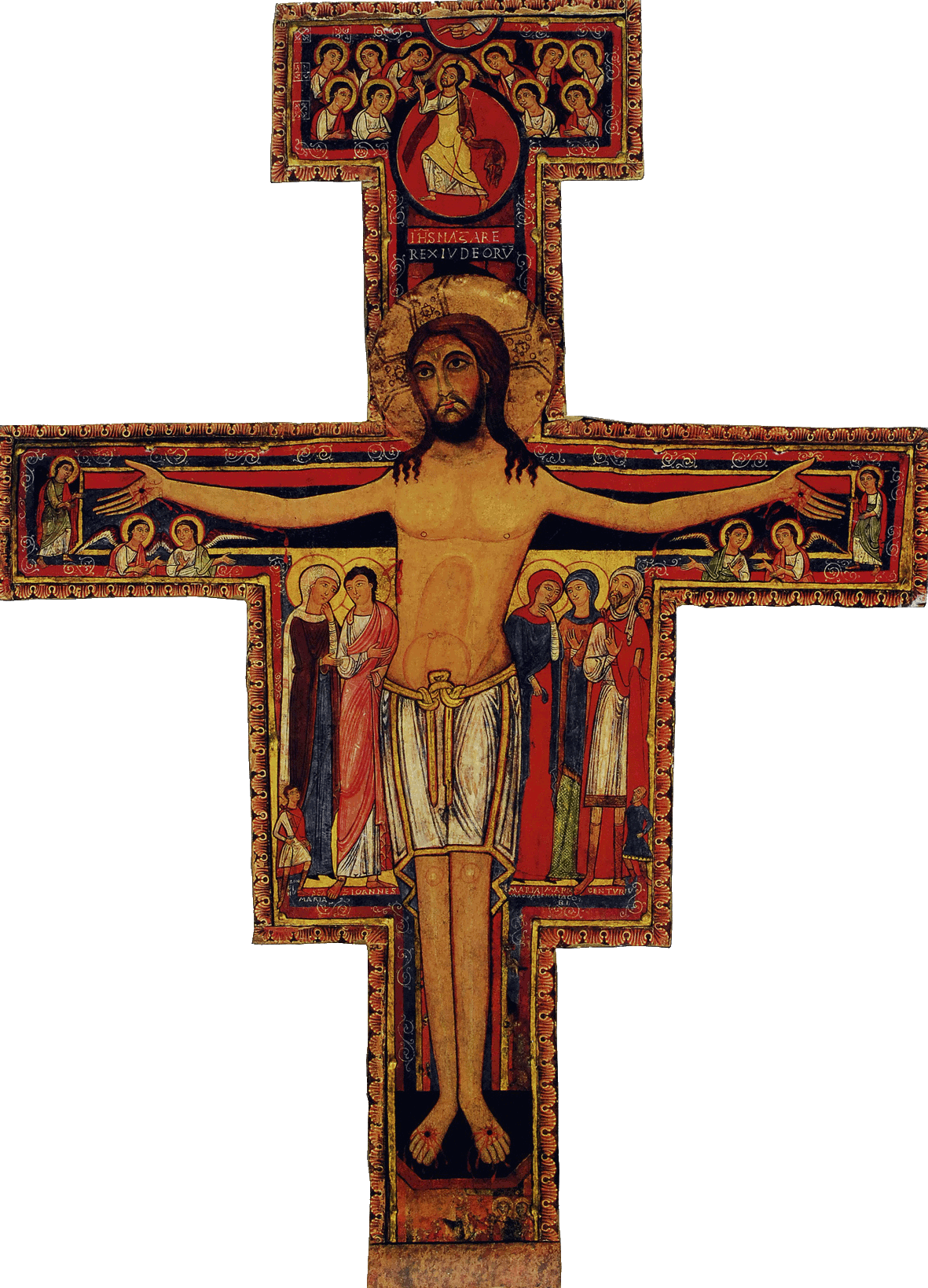
San Damiano crucifix
Circa 1100
Tempera on wood
-Maniera greca
•Miraculous interaction with St Francis
•This is an example of Christus triumphans (he is not struggling)
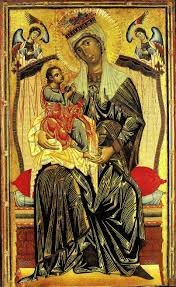
Coppo di Marcovaldo
Madonna and Child
Circa 1265
Tempera and gold on wood
•Maniera greca
•Icon
•Typical of pre-Renaissance compositions
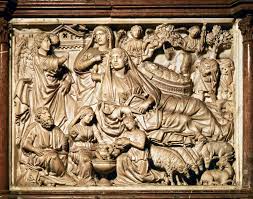
Nicola Pisano
Pulpit (detail)
Pisa Baptistery
1260
Marble
•classical and gothic form of art
•naturalistic figures
•Virgin is similar to Etruscan figures•Personification of fortitude
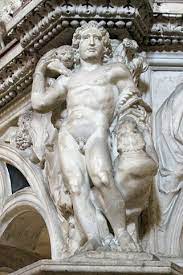
Nicola Pisano
Pulpit (detail)
Pisa Baptistery
1260
Marble
• full frontal controposto nude
•Hercules-like heroic classicizing nude in
church, consider the Church’s fraught
relationship with the body over time
- classical antiquity
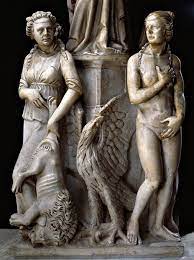
Giovanni Pisano
Pulpit (detail)
Pisa Cathedral
1297-1301
Marble
-Personification of prudence on right
•Venus pudica body style
•Another classicizing nude incorporated
into church decoration
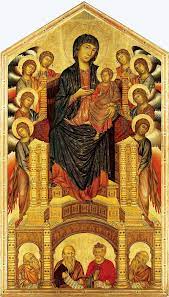
Cimabue
Santa Trinita Maestà
Circa 1290-1300
Tempera on panel
-Moving away from maniera greca
•virgin and baby jesus is looking exactly at you like they are speaking to viewer
•Virgin’s foot coming into viewer’s space creating depth
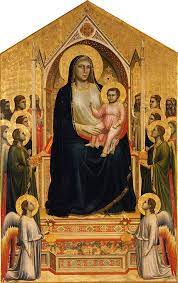
Giotto
Ognissanti Maestà
Circa 1310
Tempera on panel
• complicated 3D space
•Virgin seems to be speaking to viewer
•Shows the changer and representation of new Madona and child
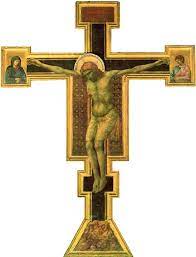
Giotto
Crucifix
Circa 1310
Tempera on panel
•storytellling aspect from top to bottom
-empasizing blood and suffuring and humanity of Christ
•Emotional and body is more naturalistic by the form
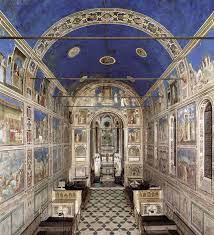
Giotto
Scrovegni Chapel, Padua
Circa 1303-1306
Fresco
•Chapel for Scrovegni family
•Complex and meaningful relationship
between juxtaposed fresco scenes
•Giotto experiments with space, depth, and
narrative, showing his learning and skill
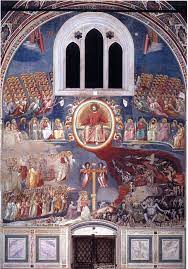
Giotto
Last Judgment
Scrovegni Chapel, Padua
Circa 1303-1306
Fresco
•Enrico Scrovegni was a usurer, and was
worried about his eternal soul
•Chaotic hell scenes emphasize
connections between money and sin
•Votive portrait of Enrico donating the chapel
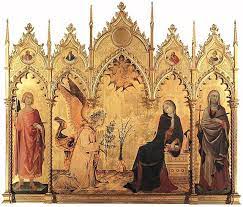
Simone Martini
Annunciation
Circa 1330
Tempera and gold on panel
•a possible French Gothic influence?
•Pregnant space between angel and Virgin
•Narrative altarpiece
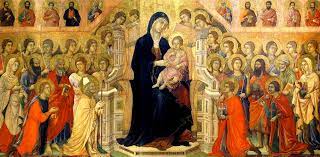
Duccio
Maestà
1308-1311
Tempera on panel
•more modern and beautiful than miracle-working icon
•Multi-panel polyptych with many narrative
scenes
•Duccio’s signature
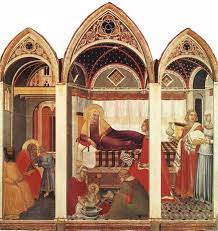
Pietro Lorenzetti
Birth of the Virgin
1342
Tempera on panel
•Narrative altarpiece
•Contemporary interior
•Continuation of space across triptic
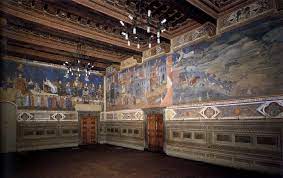
Ambrogio Lorenzetti
Allegory of Good Government
Palazzo Pubblico, Siena
1338
Fresco
• frescos to instruct and guide Siena’s
governing body
•Good and bad government’s effects on the city
and countryside
-sense of communial values, justice and the importance of community in sienna
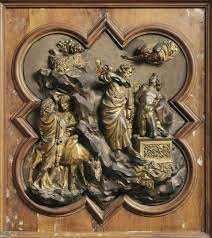
Lorenzo Ghiberti
The Sacrifice of Isaac
1401-1403
Gilded bronze
•Wins the competition for the baptistery
door commission
•Isaac as classicizing nude figure
•All figures cast as one unified piece
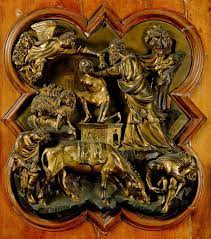
Filippo Brunelleschi
The Sacrifice of Isaac
1401-1403
Gilded bronze
•Loses baptistery door commission
•less detailed, softer and more 2D than Ghibertis
•Heavier than Ghiberti’s, composed in
multiple pieces
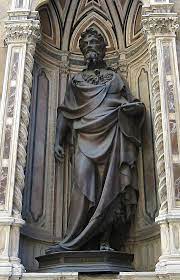
Lorenzo Ghiberti
Saint John the Baptist
Orsanmichele, Florence
Circa 1410
Bronze
•Lost wax casting
•Competition with the ancients, largest
bronze in Italy since antiquity
•Rather gothic apperence with the goopy eyes and spooky silver eyesthe light
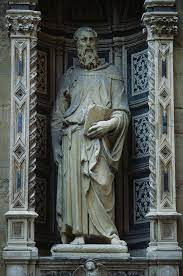
Donatello
Saint Mark
Orsanmichele, Florence
1411-1413
Marble
• non finito backside
•Natural Contrapposto, active step
•naturalistic handling of fabric
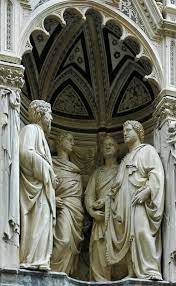
Nanni di Banco
Four Crowned Saints
Orsanmichele, Florence
Circa 1413-1414
Marble
•Sculptors’ guild commission, their patron
saints
•Acient like figures will all different characteristics
•Relief shows the artist and other sculptors of the pedistol
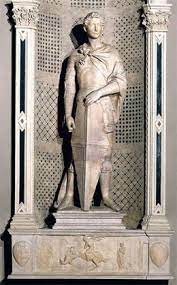
Donatello
Saint George
Orsanmichele, Florence
Circa 1415-1418
Marble
•Looking behind the viewer at the dragon?
•Activation of space..with him looking forward past the viewer
•Relief depicts proto-perspectival space
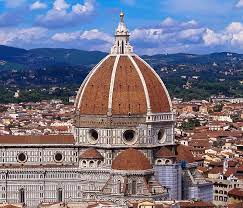
Filippo Brunelleschi
Dome of Santa Maria del Fiore
Florence
1423-1438
• Engineering project for Brunelleschi
• double-shell dome and pointed arches
•Many engineering inventions during its
building process
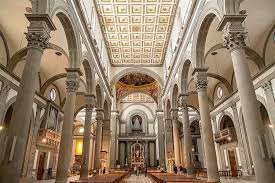
Filippo Brunelleschi
San Lorenzo
Florence
1418-1459
•Classisizing elements coming from christian antiquity rather than pagan antiquity
•plan is simplified, symmetrical and logical
• private chapel is presented for the family who bought the church
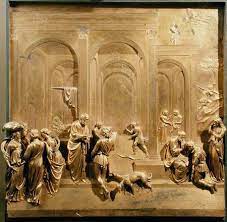
Lorenzo Ghiberti
Jacob and Esau
Florence Baptistery (detail)
1425-1452
Gilded bronze
•10 big panels on the baptistery doors
•Depth of relief shows multiple stages of narrative
• Shows Ghiberti following Albertis rules of art with tequnique and skill
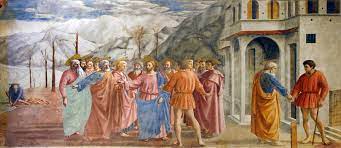
Masaccio
The Tribute Money
Brancacci Chapel
Santa Maria del Carmine
Florence
1426-1428
Fresco
•3 part narrative which starts at center, left and then right
•Perspectival space, naturalistic setting
•Jesus as vanishing point
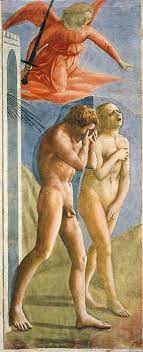
Masaccio
Expulsion from the Garden of Eden
Brancacci Chapel
Santa Maria del Carmine
Florence
1426-1428
Fresco
•Venus pudica body movement
•Naturalistic bodies, not idealized nudes
•Giornata lines
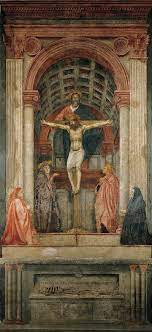
Masaccio
The Trinity
Santa Maria Novella
Florence
1425-1428
Fresco
• vanishing point on Jesus
•Illusionistic chapel
•Memento mori
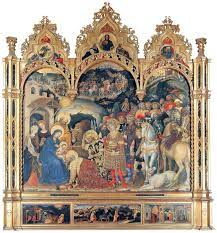
Gentile da Fabriano
Adoration of the Magi
1423
Tempera and gold on pane
•Influence of Gothic?
•Not using strict Brunelleschian perspective
•Gold leaf and Lapiz lazuli shows a new value to the paitning
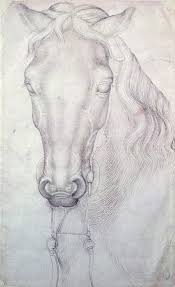
Pisanello
Drawing for Vision of Saint Eustace
Pen and ink with black chalk on paper
Circa 1434-1442
•follows Alberti’s rules in practice drawing
•Drawing disegno to prep for painting
• makes drawings for a variety of
figures to return to and maybe use later
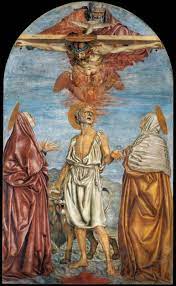
Andrea del Castagno
saint Jeromes vision of the trinity
santissima annunziata
fresco, florence circa 1453
working out how to depict a vision, fusing supernatural and natural
two planes of reality
forshortning
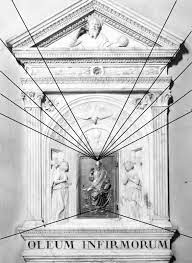
Bernardo Rossellino
Eucharistic tabernacle
marble and bronze
1449
perspective presentation
conserated Eurcharist as vanishing point
visual focus of devotion, radiating holiness
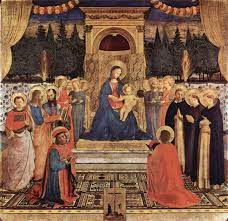
Fra Angelico
San marco altarpiece
1438-1443, tempera on panel
Curtains revealing a vision
first altarpiece in one point perspective
virgins womb as vanishing point
possible memento mori
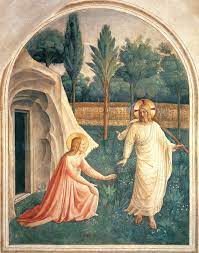
Fra angelico
Noli me tangere
convent of san marco, florence
fresco
Monks private room
dissemblance, making sense out of nonsence
flowers on the ground can signify Jesus blood and his wounds specifcially 5 of them) aka called stigmata
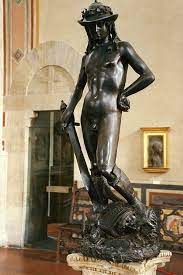
Donatello david
bronze
Archaizing, classicizing nude
first freestanding lifesize male
breaking with tradition depicting david naked
controversial and talked about a lot
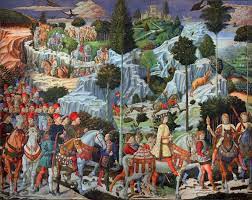
Benozzo Gozzoli
procession of the Magi (detail)
palazzo medichi-Riccardi
florence, fresco
Portraits of medichi family and friends
richness of detail wins out over strict perspectival space
processing toward altarpiece
rich of detail and an example of a maximalist piece
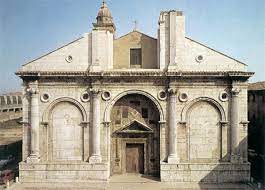
Leon battista alberti
tempio malastiano
rimini
christian church dressed up like a pagan temple, archaizing style
movign away from christian ideas
devoted to malesta rather than jesus
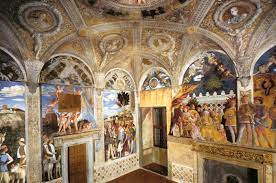
andrea mantegna
camera picta, plazzo ducale
mantua, fresco
Gonzaga family portraits eyes dont meet viewier gaze
emphasis on gonzaga legacy and legitimacy
illuonistic forshaddowing
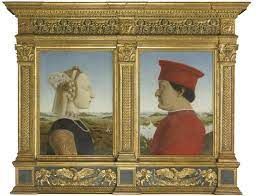
Piero della francesca
battista sforza and frederico da montefeltro
standard quattrocentro profile format
allegorical, triumphal imagery on backside
woman is idealized versus the man who isnt idealized
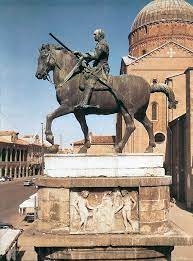
Donatello
gattemelata monument
padua
bronze
engaging with ancient equestrian portrait
fusion of ancient and contemporary armor
activating horse by lifting its hoof with a cannonball
contemporary warfare with ancient forms
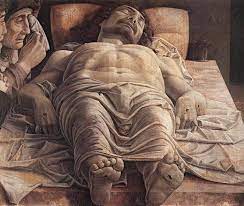
andrea mantegna
lamentation over the dead christ
tempera on canvas
extreme foreshortening
emotionally involving the viewer
emphasizing the humanity of christ
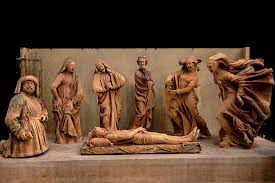
Niccolo dell’ arca
lamenation
santa maria della vita
bologna, terracotta
Dynamic and emotionally charged
frantic, emotional depiction of the virgin
terracotta allows niccolo to take more sculptural and structural risks
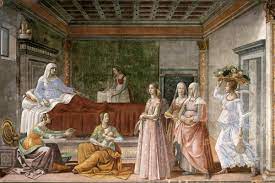
Domenico Ghirlandaio
the birth of john the baptist
tornabuoni chapel
santa maria novella
florence, fresco
Warburgs nympha figure
tornabuoni family portraits
fusing the antique with contemporary florence
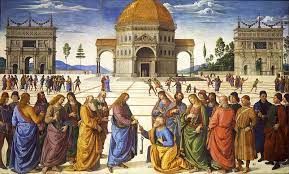
Pietro perugino
the charge to peter
sistine chapel
vatican city, fresco
visualizing the church’s authority, line of succession from the popes back to christ
one point prespective
archaizing setting
brunelleschian inspired church/chapel in the back
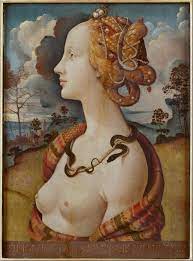
Piero di cosimo
portrait of a woman
oil on panel
standard quattrocento profile format
allegorical portrait as cleopatra
state of undress is intresting because this portrait of florentine woman is a lady of status which is not common for her to be showing skin
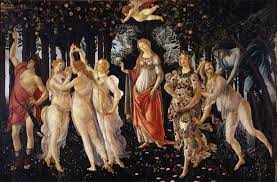
Sandro Botticelli
primavera
tempera on panel
venus genetrix as godess of fertility themes of motherhood, garden, spring
medici wedding present?
historia vs. ut pictura poesis
reads from right to left
suttle hierachy
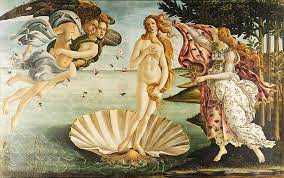
sandro botticelli
the birth of venus
tempera on canvas
perhaps for a cassone?
venus pudica figure with blonde hair like the poet petrach’s famous muse, laura
golden blonde hair was tuscan inspired
not going for naturalistic, there is an empsasis on makign them look graceful not natural
emphasiszed femininity
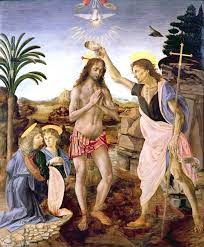
andrea del verrocchio and leonardo da vinci
the baptism of christ
tempera and oil on panel
leonardo trained as an apprentice in verrocchios studio
difference in style with leonardos angel (more realistic 3D, almost perfect) vs verrocchios (flat and not “perfect”)
theme of the student outdoing the teacher
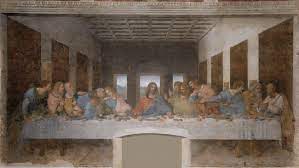
leonardo de vinci
the last supper
santa maria delle grazie
milan, fresco
expirementation with fresco secco and compositions
vanishing point between jesus head
representation of judas is problematic
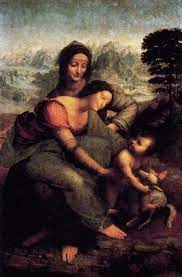
leonardo da vinci
study for the virgin and child with saint annex
charcoal, pen and watercolor on paper
drawing as leonardos early research and development stage of painting
drawings should be messy like a poets rough draft
leonardo is showing tecniques just like alberti
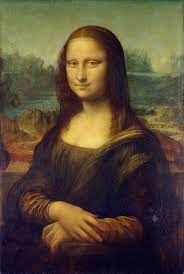
Leonardo da vinci
mona lisa
oil on panel
sfumato does away with hard lines
changing format, appearance, function of the point
image not made with human hands
warm personality she is radiating to the viewer because of her soft eye contact
she kind of feels like a subject the way she is sitting
hands are so essentially leonardo
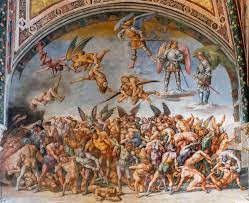
luca signorelli
the damned cast into hell
san brizino chapel
fresco
emphasis on the demonic body’s that are different color to what we have seen before like in giottos
increasing emphasis on the muscular, heroic male body without clothes
disengo from the bones on up, signorelli draws his atatomical figures from life
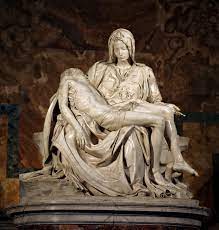
Michelangelo
pieta
marble
both the virgins and jesus body are ideal and almost “perfect”
competition with antiquity, contract stipulated that this needed to be the most beautiful marble
is Jesus only sort of dead-ish? veins in hands seem full of blood
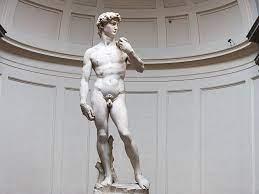
Michelangelo, david
marble
meant for the cathedral but repurposed as anti-medici political statement
possibly the moment in narrative before goliath dies
increasing emphasis on the heroic male nude as a defining element of florentine art
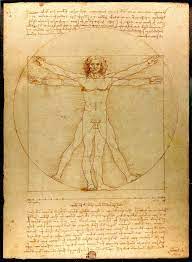
leonardo da vinci
virtuvan man
pen and ink on paper
leonardo seeks anatonical knowledge for its own sake
anatomical ratio
body as something glorified, dignified, elevated and beautiful